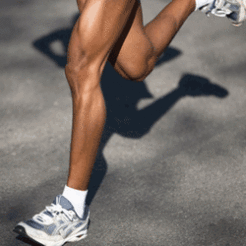With the second week of the Olympics well underway, David Philpott reflects on what has inspired him recently.
“So there you have it,” began my Facebook status update on Sunday morning. “Our overpaid, underachieving, vain-glorious footballers disappoint again and hitherto unheard-of athletes, rowers and cyclists make the nation proud.”
It’s hard for a man who loves his football to make such observations but one cannot help but be inspired by the achievements of Team GB. And then of course, when this bit is all over, we will marvel at the exploits and accomplishments of double-amputees and such like as they light up the world in the London Paralympic games.
It was pure coincidence though, that at such a time of national sporting endeavour as this, that I found myself in a sports centre a fortnight ago – just before Danny Boyle’s stunning opening ceremony lit up the London skyline.
In many ways the Aspire National Training Centre – the sports centre of which I write - feels just like any other civic leisure building. Granted, it nestles in leafy woodland more in keeping with an expensive country club on the outskirts of Stanmore in Middlesex, and were it not for roadside signage here and there, one would never know that it had been built in the grounds of the Royal National Orthopaedic Hospital. That is, until one walks through the automatic doors and into the ambient foyer area, for it is here that customers of these state-of-the-art facilities are greeted by wheelchair users who man the reception desk.
On average only 2 per cent to 3 per cent of customers at a municipal sports centre are disabled, but Aspire - the charity that runs this national centre par excellence - has over ten times that amount, many of this 30-odd per cent having suffered spinal injuries.
In days of yore when I held an entirely different portfolio in life, I was often told by offended parishioners to practice what I preached, so it was refreshing to find that Brian Carlin, the powerhouse behind the National Training Centre, does exactly that. Last week, having just completed a long triathlon in Spain, he sent me this account of the tensions and exhilaration of taking part.
“We arrived to drizzle, dark skies and a cold chilling breeze. We had lots of time to make final kit checks and get our wetsuits on. Finally the drizzle faded and it started to warm up a little... you could feel the atmosphere starting to become charged with a mixture of athlete excitement and nerves. Then... a loud sound of timpani drums, beating to the rhythm of a heartbeat filled the air. The athletes looked around at each other to see if we were all starting to feel the tension this was creating in the build-up to the start of the race. The Elites were already at the water’s edge as the rhythm continued to pound. Then the music from Pirates of the Caribbean (He’s a Pirate) broke the heartbeat and stirred a gladiatorial sense of preparing for battle. The sequence was repeated; heartbeat, then music, wave of athletes after wave. No-one was talking as we gathered, waiting to be called to the water’s edge.
"We’re given the one-minute call as we are lined up, just over 200 of us – 50 across and five deep and the music began again. Heart rates were racing, nerves were building, emotions were charged and BANG! Like warriors rushing at an enemy, the mass of athletes ran at the water as each and every one of us tried to find water space. The water was soon as white froth; then a sudden silence as you dive in. The silence is short-lived though as you surface with your first arm-stroke. The sound of the music has been replaced with thrashing water, the sound of gasping breath and accompanied by the power of your choking heartbeat. Battle commenced...”
Brian - the CEO of Aspire - spent much of his early career running sports and leisure centres but it was when he met the triathlete Paula Craig that he was motivated to take up the sport. She had incurred a spinal cord injury whilst out training on her bike and it was while undergoing her rehabilitation that he got to know her and was inspired by her determination to return to her sport.
However, for Brian, triathlon was not enough; for him it has become long triathlon, which the International Triathlon Union describes as “Using the triathlon principle of swim-bike-run, long-distance events are usually held over double or triple the length of the standard distance. Athletes require high levels of stamina and endurance as races for the elites can last up to seven hours”. It is a credit to him that he has been picked to represent Great Britain in recent years.
So how does a busy chief executive of a national charity find time to train for such a gruelling endurance sport, I wondered?
“It’s not easy but I believe that if you want to do something, you will find the way to do it”, he once told TriNews. “There have been many times I have felt too tired to train when I get home from work, but I just get changed and get on with the training. I know that post-workout feeling of satisfaction will be worth it. I never want to arrive at a race knowing I didn’t prepare as best I could.”
Just as Paula Craig inspired Brian to make something of his leisure time, Brain has inspired me. This weekend I finally did it. I have been putting it off for months and months, but I summoned up all the energy I had, got in the zone and did it. I jet-washed the patio and boy, do I feel proud of myself!
Brian Carlin, I salute you.









